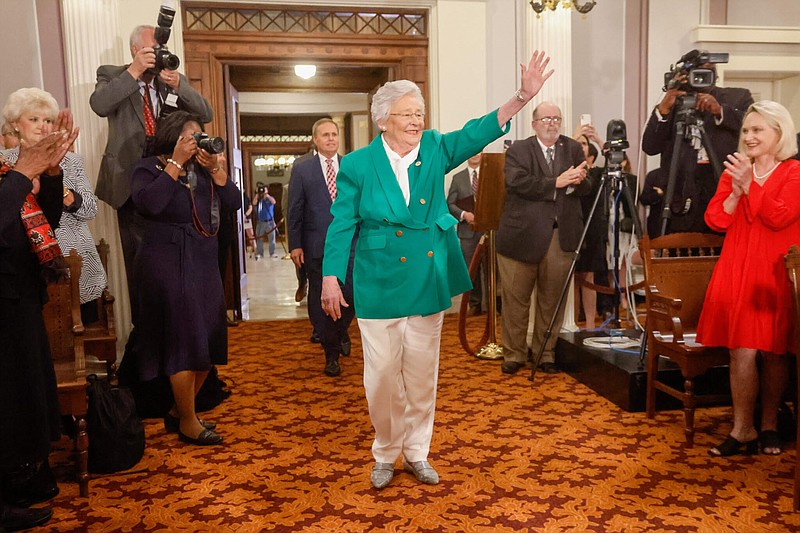Alabama Gov. Kay Ivey signed a ban on transgender college athletes participating in sports that correlate with the gender they identify as.
"Look, if you are a biological male, you are not going to be competing in women's and girls' sports in Alabama," Ivey said in a statement Tuesday.
House Bill 261, sponsored by Rep. Susan DuBose, R-Hoover, expands the current ban on transgender athletes in high schools in high school competition. That legislation was signed into law by Ivey in 2021.
The new legislation requires college athletes to play sports that align with their "biological sex."
"I would like to say that I think this speaks to the fact that Alabama has common sense, that we stand with science, that we want to protect women and make sure they have a safe and level playing field when it comes to competitive athletics at the college level," DuBose said in a phone interview Tuesday.
"My goal is to protect women athletes," DuBose said.
Ivy signed the new law Tuesday.
(READ MORE: Georgia law will ban most transgender surgeries, hormone replacement for kids under 18)
It is not clear that transgender athletes have any advantages or disadvantages over cisgender athletes. An April article in Science said the results from tests do not allow the development of evidence-based policies on the issue.
An Inside Higher Ed article from 2022 said there were approximately 30 transgender individuals playing NCAA sports, out of 480,000 athletes.
The nation is in the midst of an "extraordinary and unprecedented avalanche" of state bills that are focused on transgender children, a small group of children, said Shannon Minter, legal director at the National Center for Lesbian Rights.
"These bills — and increasingly laws — have proliferated, and proliferated dramatically, in the past two years, but especially this year, the number has been off the charts," he said.
The bills stem from a political effort to scare the public about a group most people don't know anything about, he said, which led to state legislatures introducing or passing laws that are "cruel, devastating, completely misguided bills (and) are based on profound misinformation."
"With transgender people, we're still at that stage where most people do not know one single transgender person. They're very vulnerable to hearing lies and misinformation and fear mongering. So that that campaign of misinformation has been very successful," Minter said.
Dillon Nettles, the policy and advocacy director at the ACLU of Alabama, said in a statement the bill is unnecessary and would have unintended consequences.
"Its only purpose is to shame transgender people publicly. The reality is that trans folks will always be part of our schools, universities and our community," Nettles said.
Rep. Neil Rafferty, D-Birmingham, maintained that the legislation won't solve a real problem in Alabama.
"It's targeting a fraction of a percent of people," he said. "If we really want to help women and girls in this state, then we should focus on making sure that they have access to great health care, great education and opportunity."
He brought up the mass shooting in Dadeville that occurred in April that left at least 32 people injured and killed four more.
"Some of the Dadeville victims were athletes, right? This bill does nothing to have prevented or protected them. We need to be making sure that we're taking gun violence and measures to protect our youth from gun violence, which is the number one killer of youth in the United States now," Rafferty said.
(READ MORE: Bills targeting LGBTQ communities introduced in Alabama House)
The vote was not along party lines. It passed on an 83-5 vote with 14 abstentions in the House, and it passed 26-4 in the Senate. DuBose called the bill bipartisan.
In the House, four Democrats voted for the legislation: House Minority Leader Rep. Anthony Daniels, D-Huntsville; Rep. Juandalynn Givan, D-Birmingham; Rep. Patrick Sellers, D-Birmingham; and Rep. Pebblin Warren, D-Tuskegee. Only five voted against it, and 14 Democrats abstained from voting.
In the Senate, one Democratic lawmaker voted for the bill, Sen. Robert Stewart, D-Selma, and another, Sen. Rodger Smitherman, D-Birmingham, abstained.
DuBose said passing the legislation was part of the reason she ran for office, and as a freshman legislator, she didn't want to sit back and listen, as most freshmen do. She wanted to pass a "significant piece of legislation" in her first year.
"If we allow trans women to start competing and taking spots on teams, all of that will change," she said.
Read more at AlabamaReflector.com.
